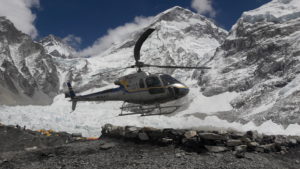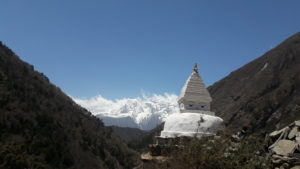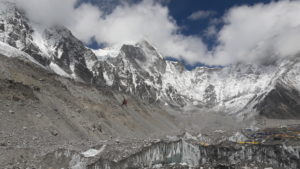Famous for its spectacular mountain peaks and the loyalty and friendliness of its inhabitants ( Sherpa ) , the Everest region (Khumbu) is one of the most popular destinations for tourists in Nepal. While many of the routes through the mountains are arduous, there are ample places to rest and enjoy a meal along the way. Furthermore, don’t worry about getting lost. Just ask a local the way to the next village on your route, and they will direct you. Most Sherpas under the age of fifty can at least understand basic English, and many speak it fluently.
Everest Base Camp Trekking is possible in this area the whole year round, the best times to visit are from the beginning of March to mid of May and from the beginning of September to first week December . The winters are very cold and snow may make it difficult to travel higher than Tengboche , and also some lodges closed above this altitude. Summers, on the other hand, are wet, and the spectacular peaks are often lost in the clouds. April and early May is a good time to see the hedgerows and trees bursting into bloom, with Rhododendrons, in particular, adding a spectacular splash of color to the landscape. However, dust from the plains of India during the spring routinely provide less than ideal conditions for clear mountain views. The views are much better after the summer monsoons have cleared the atmosphere of dust, but the days are shorter and cooler.


Outline Itinerary
- Day 01: Arrival in Kathmandu and trip preparation (1,300 m/4,264 ft)
- Day 02: Fly to Lukla , trek to Phakding (2,651 m/8,700 ft): 8 km, 3 – 4 hours trek
- Day 03: Phakding to Namche Bazaar (3,438 m/11,280 ft): 11 km, 5 – 6 hours
- Day 04: Acclimatization Day – Namche Bazaar: (3,440 m/11,284 ft)
- Day 05: Namche Bazaar to Tengboche (3,870 m/12,694 ft): 10 km, 5 – 6 hours
- Day 06: Tengboche to Dingboche (4,360 m/14,300 ft): 9 km, 5 – 6 hours
- Day 07: Dingboche: Acclimatization
- Day 08: Dingboche to Lobuche (4940 m/16,207 ft): 7 km, 5-6 hours
- Day 09: Lobuche to Gorak Shep (5,170 m/16,961f t), visit Everest Base Camp (5,364 m/17,594 ft): 13 km, 6-7 hours
- Day 10: Gorak Shep to Kala Patthar (5,545 m/18,192 ft) to Pherice (4,288 m/14,070 ft): 16 km, 7-8 hours
- Day 11: Pheriche to Namche Bazaar (3,440 m/11,280 ft): 20 km, 6 – 7 hours
- Day 12: Namche Bazaar to Lukla (2,800 m/9,186 ft): 19 km, 6 – 7 hours
- Day 13: Fly to Kathmandu
- Day 14: Final departure
Not really satisfied with this itinerary ? Make your own
Included in the cost :
- Airport pickups and drops in a private vehicle
- Accommodation in Kathmandu with breakfast
- Tea house accommodation during the trek
- All meals (breakfast, lunch and dinner) during the trek
- Welcome and farewell dinners
- All ground transportation on a comfortable private vehicle as per the itinerary
- Domestic flights (Kathmandu- Lukla -Kathmandu)
- An experienced, English-speaking and government-licensed trek leader and assistant trek leader (4 trekkers: 1 assistant guide)
- Porter service (2 trekkers: 1 porter)
- Staff costs including their salary, insurance, equipment, domestic airfare, food and accommodation
- Down jacket and sleeping bag (to be returned after trip completion)
- All necessary paperwork and trekking permits (National Park Permit, TIMS )
- Medical kit (carried by your trek leader)
- All government and local taxes
(Vivid Nepal trekking bag/duffel bag, t-shirt and trekking map are yours to take.)
Not really ? !!!
CUSTOMIZE IT !
Accommodations
We will be staying at hotel in Kathmandu; and tea houses during the trek. All accommodations are on twin-shared basis. Single supplement will be served on request and will cost an additional US $320. Vivid Nepal will arrange rooms with attached washrooms; however, tea houses in some places only have shared washing and toilet facilities. Also note that single rooms are readily available in Kathmandu and the trekking regions at lower elevation but it might be difficult to find them at higher elevations.
Meals
All meals will be provided during trekking while only breakfast will be available in Kathmandu. There will also be welcome and farewell dinners for guests. While on trek, we have breakfast and dinner in the tea-houses/lodges we spend the night and lunch on our way to the next destination. Nepalese, Tibetan, the more common continental and Indian cuisines are common choices in the menu.
Physical Condition & Experience Requirements
Everest Base Camp Trek- 16 days is a moderate trek. Travelers who can walk up to 6-7 hours a day on an uphill and downhill trail will find this trek fulfilling. It is best that we prepare ourselves for the Everest trek by jogging and exercising regularly at least a month prior to the start of the trek. Trekking to the Everest Base Camp should be relatively easier for those who have experience walking/trekking in a high altitude environment. Past hiking experience would be an asset but no technical skill is required for this trip. It is also important that we consult our doctor. Participants with pre-existing medical conditions such as heart, lung, and blood diseases should inform Vivid Nepal before booking the trek.
Best Time to Travel
The best time to trek to the Everest Base Camp is Spring (March to May) and Autumn (September to November). The temperature is moderate in these seasons and guarantees amazing views through the trip. Although this trek can be undertaken during winter, the cold temperature might not be suitable for everyone.
Home trip Detail 14 Days Everest Base Camp Trekking
14 DAYS EVEREST BASE CAMP TREKKING
14 DAYS With eight of the world’s ten highest peaks. Nepal is renowned for its spectacular mountain vistas. Ever since the days of early climbing expeditions, Mount Everest, standing at 8,848 m has had a lure of its own,drawing avid climbers and trekkers to gaze on its magnificence.Your journey through this majestic region will immerse you in the vibrant local culture and traditions, colorful festivals and monasteries, picturesque villages and the gentle spirit of the Sherpa people.

